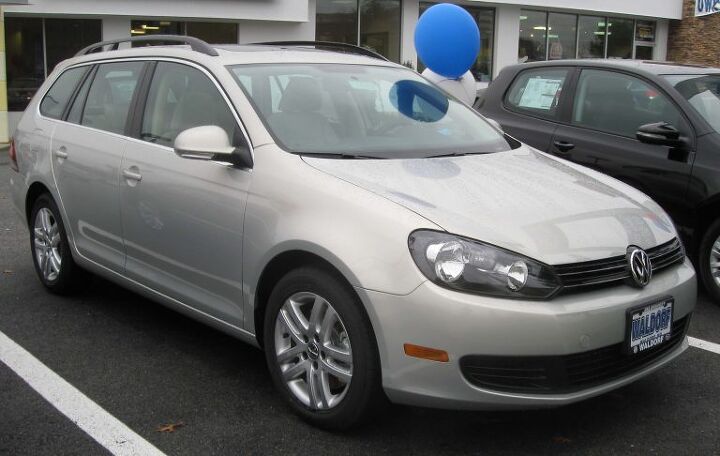No (Four) Pot of Gold: Some Volkswagen Diesel Owners Are Stuck Between Borders

U.S. owners of illegally polluting Volkswagen diesels have already flown to sunny vacation spots or picked up a new vehicle with the help of buyback and compensation checks. North of the border, over 100,000 Canadians who own a 2009-2016 TDI model are waiting for their cut of a $2.1 billion settlement.
However, Volkswagen’s “we’re sorry” gravy train isn’t rolling into everyone’s driveway. Some owners are finding that their vehicles are stuck in a cross-border limbo.
Consider the plight of a Toronto-area woman who picked up a used fifth-generation Jetta in July of 2015. Just two months after getting into her new ride, Jacqueline Charlesworth — like so many others — discovered that her vehicle was a rolling pariah. And, like so many others, Charlesworth hoped to drop the model in exchange for cash.
Unfortunately, taking part in VW’s self-shakedown proved difficult. Seventeen months after the scandal went public, Charlesworth still owns the car, with no guarantee of a payment. The problem lies in the vehicle’s American VIN, and the fact that it’s now registered in Canada.
“I’m really stuck in between two worlds,” the owner told CBC.
Charlesworth found she wasn’t able to take part in the Canadian settlement, as her car hails from the U.S. No problem, as Volkswagen offered her $13,425 from the American settlement pot. Confident in knowing that her car would soon be gone and her compensation money would soon be in the bank, she bought a replacement vehicle.
That’s when her plans went south.
Two weeks ago, Volkswagen sent a letter explaining that it couldn’t offer her the money, as her car was registered in Canada before the September 2015 cut-off date. That’s a big problem, as Charlesworth planned to use the money to support her family. Since receiving the letter, she has attempted to sell the car online, only to find that no one wants to buy a “scandal car.”
Meanwhile, she hasn’t heard anything more from the company, nor has she heard back from lawyers contacted in an attempt to recoup the cost of her Jetta. Volkswagen Canada hasn’t replied to CBC‘s requests to find out if the automaker plans to bring marooned owners like Charlesworth into the Canuck settlement.
The number of owners trapped in the cross-border loophole is small, but their headache isn’t a minor one. According to David O’Connor, partner at Roy O’Connor LLP, one of many firms working on a class action lawsuit against Volkswagen, 15 to 20 clients have contacted law offices in Canada for this exact problem.
[Image: Volkswagen of America]

More by Steph Willems
Latest Car Reviews
Read moreLatest Product Reviews
Read moreRecent Comments
- Probert They already have hybrids, but these won't ever be them as they are built on the modular E-GMP skateboard.
- Justin You guys still looking for that sportbak? I just saw one on the Facebook marketplace in Arizona
- 28-Cars-Later I cannot remember what happens now, but there are whiteblocks in this period which develop a "tick" like sound which indicates they are toast (maybe head gasket?). Ten or so years ago I looked at an '03 or '04 S60 (I forget why) and I brought my Volvo indy along to tell me if it was worth my time - it ticked and that's when I learned this. This XC90 is probably worth about $300 as it sits, not kidding, and it will cost you conservatively $2500 for an engine swap (all the ones I see on car-part.com have north of 130K miles starting at $1,100 and that's not including freight to a shop, shop labor, other internals to do such as timing belt while engine out etc).
- 28-Cars-Later Ford reported it lost $132,000 for each of its 10,000 electric vehicles sold in the first quarter of 2024, according to CNN. The sales were down 20 percent from the first quarter of 2023 and would “drag down earnings for the company overall.”The losses include “hundreds of millions being spent on research and development of the next generation of EVs for Ford. Those investments are years away from paying off.” [if they ever are recouped] Ford is the only major carmaker breaking out EV numbers by themselves. But other marques likely suffer similar losses. https://www.zerohedge.com/political/fords-120000-loss-vehicle-shows-california-ev-goals-are-impossible Given these facts, how did Tesla ever produce anything in volume let alone profit?
- AZFelix Let's forego all of this dilly-dallying with autonomous cars and cut right to the chase and the only real solution.


































Comments
Join the conversation
1. She can keep it. 2. If she can find an American to buy it, they can flip it to VW for the settlement offer. But she will have to sell it for well less than VW is offering for it. 3. If she has the stomach for it, she can file a suit independent of the two class action suits (aka, opting out of the settlement class) and probably get more money back than she would by taking either settlement.
I don't understand: "Two weeks ago, Volkswagen sent a letter explaining that it couldn’t offer her the money, as her car was registered in Canada before the September 2015 cut-off date. That’s a big problem, as Charlesworth planned to use the money to support her family." So, she bought a car. Somehow she must have thought she hit a lottery? In 2015, she bought the car. Other than her inability to sell it, how is it that her situation now is different than if it were not a TDI? Would she have otherwise sold it because she found herself unexpectedly needing cash? Details, details.